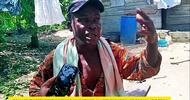A paramilitary unit of the Liberia National Police was deployed into the area after residents attempted to halt the survey.
New WRM video based on interviews with people from communities in Africa affected by the expansion of oil palm plantations.
Le dernier bulletin d'information de la Commission de l'UEMOA et du Hub Rural sur les actualités foncières ouest-africaines vient de paraître
- Commission de l'UEMOA / Hub Rural
-
18 September 2013
"Instead of handing over farming land to foreign companies, our government should promote policies that sustainably increase productivity and help Liberian farmers access local markets," says Friends of the Earth Liberia.
Demand for the lucrative oil is increasing and land in the main exporting countries of Malaysia and Indonesia is quickly running out, so companies are now looking to the hot, humid countries along the Equator in West Africa.
Le dernier bulletin d'information de la Commission de l'UEMOA et du Hub Rural sur les actualités foncières ouest-africaines vient de paraître
- Commission de l'UEMOA / Hub Rural
-
09 September 2013
Muchas comunidades se están rebelando ante esta situación, con gobiernos corruptos títeres de las transnacionales.
- Solidaridad
-
21 August 2013
Investigation conducted revealed that Equatorial Palm Oil's operation in Bassa is currently experiencing setback owing to the action by the Legislative Caucus via the citizens. As a result, the company is contemplating on a possible pull out.
- The New Dawn
-
14 August 2013
Sifca Group, which owns Africa’s biggest palm-oil refinery located in Ivory Coast, said it plans to spend $417 million in the next five years on plantations and factories in Ghana, Nigeria and Liberia.
European banks, pension funds and private equity funds have given financial assistance worth more than €450 million to Malaysian palm oil giant Sime Darby, responsible for environmental degradation and violations of national regulations in Liberia.
La multinationale française Bolloré s’est accordé jusqu’au 30 juin pour donner suite aux revendications des paysans riverains de ses plantations, qui manifestent dans plusieurs pays africains contre l’expansion des activités du groupe sur leurs terres.
Sackie Qwemie travaille pour Equatorial Palm Oil (EPO), l’entreprise qui a pris sa terre dans le nord-ouest du Libéria.















